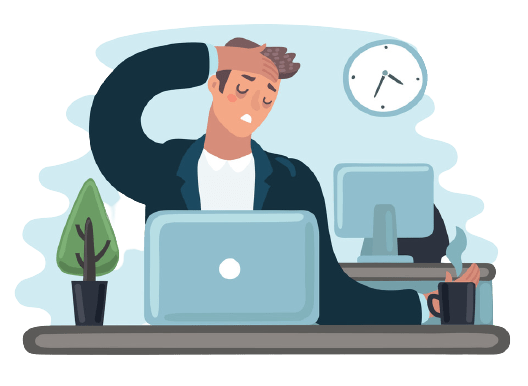Online stress Counselling | Best therapist for stress help
- Affordable and confidential stress counseling sessions
- Video calls or chat sessions with Counsellors/ Psychologists specialized in stress issues
- Improve your mental wellbeing whenever and wherever you want
Begin Therapy
Consult online with best Therapist
"*" indicates required fields
A ‘Better’ Model for stress Counselling
Mantracare is with you on the journey to heal your stress. We will help you right from knowing the root causes of your stress to learning healthy coping mechanisms. Our therapies are 100% online and are conducted via video call or messaging. So, feel free to take sessions wherever, whenever you need it
Specialized Therapists
As per your story and case, we assign the best counsellors experienced in stress issues. They work with you proactively to understand and address the root cause of your stress, hopelessness, and persistent sadness.
Affordable & Effective
We believe that therapies should be driven more by “Need” than “ability to pay”. Our online sessions are 90% less expensive than face-to-face therapy. Online counseling starts at just $10.
Stress Self Care
We provide you continuous stress help with self-care tools, mental healing videos, chat groups, meditations, breathing exercises and more. Our therapists are available 24/7 via messages to provide care, whenever and wherever you need it.

Best stress Counselling, Now in Your Pocket
Our therapists our counselors are available in all parts of the world, accessible via an easy-to-use mobile application. Our matching experts take your preferences in consideration and connect you with therapists specialized in stress issues. Moreover, there are hundreds of free self-help tools on our app, available 24×7.

How it works
After filling out our questionnaire, you will be matched with a stress counselor based on your needs and preferences. You and your counselor will get your own secure and private “therapy room” where you can message your counselor at any time wherever you are. You can also schedule a session so speak live with your counselor over video or phone.
You can write or talk about stress, the things going on in your life, ask questions, and discuss the challenges you’re facing and your counselor will provide feedback, insights, and guidance. Together you’ll work towards making a positive change in your life, accomplishing your goals, and overcoming your stress.

Signup for stress counselling
Just fill up a 5-minute online form to tell us about your stress symptoms and treatment expectations.

Meet your Therapist
Based on your preferences and neet, we will connect you with Depression counselors that are available 24/7 to you via call or chat.

Connect to our app
Heal yourself with video or chat counselling sessions available in the app. Access helpful self-care tools on our app to help you heal your depression, and take control of your life
Meet the best stress Therapists
MantraCare psychologists help you counter stress through a combination of positive conversations, exercises, and meditations. Our stress therapy services are better than traditional face-to-face counseling in multiple ways:
- Over 5,000 counselors & therapists with expertise in stress and other areas
- All counselors are licensed, trained, accredited, and highly experienced
- Match with an available counselor who is the best fit for your stress needs
- Unlimited private one on one communication with your therapist
- Gain access to constructive, educational group webinars on stress

A Guide on Stress
Understanding stress
The word stress is widely used by most of us but only a few of us actually understand it. It is often misunderstood or considered as sadness, or anxiety, or depression
In simplest terms, stress is tension; emotional or physical. It is a pressure to which your body and mind respond. Several situations and life events cause stress. Usually, all of us go through some of the other situations that cause little discomfort to us, emotionally or physically. But stress triggers up when something strange, unexpected, and threatening happens to a person.
None of us are stress-free. Because of stress, not only the mind but your body also gets affected.
Our mind is at constant exertion. The body still gets some rest when we relax or sleep. But the mind keeps toiling even when we’re asleep. It never stops thinking.
Studies say that 75% of all the symptoms, for example, heartburn, headache, muscle tension, hypertension, gut problems sleep problems, high anxiety, and low sex drive can be traced right back to excessive stress. Eventually, these symptoms lead to serious life-threatening diseases like diabetes, depression, heart attacks, and even cancer.
You just cannot deny the connection when it comes to stress and disease. But you can use your mind, stress proof your body and become your best doctor.
Types of Stress
We hope that you have at least got your hands on what stress is. Let’s move forward to know about its types. There can be several types of stress. It’s not that all types of stress are necessarily unhealthy. Following are the types of stress:
- Acute stress
- Episodic stress
- Chronic stress
Acute stress
Acute stress, also called Acute Stress Disorder, Psychological shock, Mental Shock or simply shock is a psychological condition arising in response to a trauma or threat, either physical, emotional, or psychological that arises a strong response in an individual.
Episodic Acute Stress
It is the term used for the extended version of acute stress. Or you can say that these are the frequent episodes of acute stress.
People suffering from episodic acute stress frequently suffer from disorientation, chaos, or they find themselves in crisis often. These people are always worried about something or the other going on in their life. They are often seen taking up more responsibilities and work that gets almost impossible for them to handle. You will always find them in a rush, running late or disorganized.
Chronic Stress
Chronic stress is a kind of stress that stays with you for a prolonged time and constantly gives you a feeling of stress. Studies say that people suffering from chronic stress have high levels of cortisol hormone
Difference between Acute and Chronic Stress
In acute stress, your body gets enough opportunity to activate relaxation responses on a regular basis. Whereas in chronic stress your body suffers stressors with such an intensity that your autonomic nervous system does not have enough chance and time to activate the relaxation response regularly as required. Here, things get a little more complicated. And such people are at higher risks of all kinds of ailment:
- Heart diseases
- Autoimmune diseases
- Mental disorders like anxiety and depression
Symptoms of Stress
If a person has been suffering from stress for a prolonged time (chronic stress), the stress response keeps on working in the body. But this continued exhaustion of stress response causes certain depletion in the body. As a result, the person starts developing symptoms that can be categorized into three different categories, namely Physical, emotional and behavioral.
Physical symptoms of Stress
These symptoms appear in the body and can be noticed by all. And they include:
- Headaches: Headaches are one of the most evident symptoms of stress. Stress is an utmost primary thing that one looks at when dealing with headaches and migraine triggers.
- Aches and pains: Because of stress, your muscles go through tightness, stiffness, soreness, and pain. If stress continues for longer periods, your body starts producing cytokine molecules. These are the molecules causing inflammation and swelling in the joints, eventually leading to pain in our movements.
- Trouble sleeping: It’s true that stress causes sleeping problems. Cortisol, a stress hormone, is released whenever you feel anxious and stressed out. This hormone releases a jolt of energy that enables you to respond. And this energy is the cause of disruption in your stress
- Digestive problems: Stress affects your gut. The intensity of the effects depends on the time period your stress is with you.
- Jaw clenching: Jaw clenching is also called Bruxism, And it is often related to stress and anxiety.
- Trouble having sex: A normal biochemical functioning helps you have sex. When an excess amount of cortisol hormones are produced in the meantime of the biochemical functioning, the male reproductive system then gets affected. When it comes to a woman, too much stress affects are hormones and mood and also her desire for sex.
- Weak Immunity: When stress acres you, The stress hormone cortisol suppresses your immune system and its effectiveness to fight back the invaders. Cortisol hormone does so by lowering the numbers of lymphocytes and causing hindrance in cell communications.
Emotional Symptoms of Stress
Good stress doesn’t harm you. it comes to meet the need of the hour, does it work, and goes away. but bad stress can lead to emotional and mental symptoms like:
- Anxiety or irritability: It is but natural that stress will lead you to anxiety and irritability. You can say that stress is a way of responding to the demands of the body, be it physical, emotional or psychological. But when you are not able to manage stress and it overwhelms your personality and your life, it takes up even more serious anxiety and depression.
- Depression: The connection between stress and depression is bi-directional. the former can cause the latter and the latter can cause the former. Both can make each other’s situations even worse. Stress over time makes me highly depressed.
- Panic attacks: Sometimes it so happens that you are not able to handle the severity of your stress. Stress occurring from a feeling of death divorce or joblessness can trigger panic attacks.
- Sadness: Nobody will be happy if he or she gets affected by any kind of ailment or disease. Because they make you weak physically and psychologically. you are not able to lead your life on your own terms, leading you to sadness.
Behavioral Symptoms of Stress
You might have come across a person who has been adversely affected by stress. You will find them figuring out ways on managing their and healthy behaviors that might include:
- Gambling: People suffering from stress hunt for Little Moments of relaxation and gambling appears to them a quick solution to release stress because of the excitement the game provides.
- Smoking: Cigarettes have nicotine which provides a certain sense of relaxation to your body. So people Going through a stressed situation look towards smoking
- Eating disorders: Stress can cause someone to restrict their meals and engage in binge eating episodes as well. That is it can lead to both situations, Either you will find them eating a lot or not eating at all.
- Using Drugs: Different ways suit different people. and some resolved to Nonadaptive measures for managing stress, Including using drugs.
- Drinking too much: Again, this is another measure of why people under stress take shelter. Yes, it does provide some relief and relaxation for time being. But most of them are not aware that drinking too much will ultimately cause psychological And physical imbalances, even more.
- Having sex compulsively: Stress and anxiety makes a person hypersexual. In fact, stress is one of the major causes of hypersexual behavior.
Cognitive Symptoms of Stress
Under this the symptoms are:
- Poor judgment
- Reading problems
- Racing thoughts
- Lack of concentration
- Forgetfulness and disorganization
- Overthinking
- Pessimism
Causes of Stress
- Financial Problems: According to a study, money is the top cause of stress all over the world. A few years ago, in a survey, it was reported that over 50% of the world’s population are stressed about money at least some of the time during the previous month. The majority of the study participants in the study reported money being a major source of stress.
- Work: Nowadays, people spend more time at work compared to 20 years ago. And some of them do a second job as well. Their jobs are stressful, and they often feel burned out by their work.
- Personal Relationships: You just cannot have people with only positive attitudes around you. There are people in all of our lives that cause negativity and stressful situations. It could be anyone, a family member, a partner, a friend, or a co-worker. If toxic, these relationships can affect physical and mental health.
- Parenting: Parenting is not easy. Parents have to face a lot of responsibilities and manage busy schedules that include a job, household duties, and raising children. These demands result in parenting stress. High levels of parenting stress lead to certain kinds of inappropriate behavior that can cause you to be harsh, negative, and authoritarian.
- Daily Life and Busyness: Day-to-day stressors are our daily busyness and inconveniences. The stressors are things like, running late, forgetting to bring an important item with you when leaving the house, or misplacing keys. Usually, these are just minor issues and are negligible as well, but if they become frequent, they become a source of stress and anxiety affecting physical and/or psychological health.
Personality and Resources
Your personality traits and the resources you have available to you tie into all of the above and can be independent sources of stress as well.
Extroverts, for example, tend to experience less stress in daily life and have greater social resources, which buffer against stress. Perfectionists, on the other hand, may bring stress onto themselves unnecessarily because of their exacting standards, experiencing more negative mental and physical health consequences than those who merely focus on high achievement.
Treatment of stress
Mantracare treats stress through online counseling and therapy. The therapists and the counselors guide you through this journey of recovery on the basis of:
- Cognitive Behavioral therapy
One of the types of psychotherapy. The form of the therapy aims at modifying patterns to cause changes in moods and behaviors. CBT is an amalgamation of bot, cognitive and behavioral therapy. The therapist tries to identify the negative and unhealthy thought patterns and help the patient with behavioral answers to deal with challenging and stressful situations. - Psychoeducation
This is very effective for healing your stress and it is a pharmacological treatment considered best for treating stress. - Creative Therapy
Also known as art therapy helps you gain freedom from stress. Art is a very powerful and healing weapon. It is believed that creation can treat stress as it is a great mode of expression. One can express his/her thoughts, emotions, and behaviors. Plus, art gives a broad capacity for love, joy, and confidence. - Dialectical Behavioral Therapy (DBT):
It is a modified form of cognitive-behavioral therapy. It also helps patients with stress even if they are most destructive in their behavior. It works on 4 skill modules namely: - Mindfulness
- Distress tolerance
- Emotional regulation
- Interpersonal effectiveness.
- Acceptance and Commitment Therapy (ACT)
The therapy tries to understand the tendency of an individual and makes them realize the importance and vitality of life. It does not try to just change or stop unwanted and stressful thoughts and feelings. Rather, it tries and teaches to make new and compassionate bonds with the same experiences. - Mindfulness & Meditations
There are several types of mindful activities and meditations that help in stress, such as loving-kindness meditation, mindfulness meditation, breath awareness meditation, transcendental meditation, visualization, and body scan meditation. - Lifestyle modifications
In order to keep stress at bay, you just do not need to exercise for a manager’s time but also maintain a healthy lifestyle. By Healthy lifestyle, we mean eating a balanced amount of food and staying away from toxins. Keep in mind the following points:
- Take a healthy diet: if you provide your body with full nutrition your mind will be able to cope with stress much more easily. Never skip breakfast because it helps you keep your energy up and your mind clearer throughout the day.
- Cut down on Caffeine and sugar: caffeine and sugar are something That crashes your mood and energy. To avoid Coffee, soft drinks, chocolate, and sugary snacks.
- Say no to alcohol cigarettes and drugs: People under stress try to self-medicate themselves with alcohol or drugs so that they can escape from a stressful situation. but they fail to realize that this is a temporary relief only. Instead of this look for ways that can permanently solve your problems and this will only happen if you fight back strongly.
- Get enough sleep: an adequate amount of sleep and save the fuel for your mind as well as your body. Feeling hurt increases your stress and also leaves you to think irrationally.
Stress Management
Stress management is not that easy And the patients need to experiment and find out what goes best for them. Here are some stress management tips that are definitely going to help you in a long run:
Tip 1: figure out the sources of stress in your life:
Tip 2: stick to the four A’s of stress management, namely “avoid”, “alter”
“Adapt” and “accept”
Tip 3: Get Moving.
Tip 4: Get connected to others
Tip 5: Extract out time for fun and relaxation
Tip 6: Manage your time better
Tip 7: Follow a healthy lifestyle
Tip 8: learn to relieve your stress then and there.
10,000+ Happy & Healed stress patients

“I have experienced a number of false starts with so many therapists and was hopeless that I am going to get any effective treatment for my condition over the last 15 years. I suffer from stress due to several professional and personal reasons. Now I was skeptical about seeing any other therapist. I came across Mantra Care online therapy and thought of giving it a chance. Today I feel blessed to have taken that decision.”
Kevin, 1 year on MantraCare
5000+ stress Counselors from across the world








Our therapists take care of your ‘unique’ needs
Not all mental health problems are the same. Different types of problems require different treatments. At MantraCare, 5000+ therapist’s cover a range of specialities to meet your needs:
Frequently Ask Questions
Stress is a common and serious medical illness that negatively affects how you feel, the way you think, and how you act.
Some of the common symptoms of stress are feelings of sadness, hopelessness, headaches and pains. Other major symptoms include cramps, digestive issues, and bloating.
Some of the most serious complications of stress are mental health problems, such as depression, anxiety, and personality disorders. Cardiovascular disease, including heart disease, high blood pressure, abnormal heart rhythms, heart attacks, and stroke are some other major complications.
Stress can be of the following types:
- Acute
- Episodic Acute
- Chronic
When stress becomes a major concern, it starts causing troubles in your day-to-day life. You will not be able to concentrate even after trying so hard. You will unnecessarily start feeling tired.
Chronic stress is a kind of stress that stays with you for a prolonged time and constantly gives you a feeling of stress. Studies say that people suffering from chronic stress have high levels of cortisol hormone
Online stress therapy has been proven to have the same effectiveness as in-person therapy. There are multiple reasons why online counselling proves to be better:
No need to travel to a psychologist, sit on the same couch, and talk with the same therapist. Online stress therapy doesn’t require that you leave the comforts of your home or office. Talk to your therapist in your pajamas, sitting on your bed!
Most of us live hectic, unbalanced lives wherein scheduling a traditional therapy session becomes prohibitive. Online stress therapy allows you to set the time, location, and initial direction of the therapeutic relationship. It’s freedom that puts you, the client seeking mental health solutions, first.
We offer a vast array of free self-help tools such as stress & anxiety control exercises, relaxation techniques, mindfulness exercises, and helpful blogs. We also offer mental healing videos, chat groups, breathing meditations, and more, available 24/7 at no charge. However, there is a nominal price for stress counseling. That said, we provide one of the most affordable ways to tackle stress .
The cost of stress counseling through MindMantra ranges from $15 to $40 per week. Unlike traditional in-office therapy which can cost over $150 for a single session, your MindMantra membership includes unlimited text, video, as well as audio messaging.
Do you think you might be suffering from depression, anxiety, stress, or any other issue? Take our free emotional assessment today and find out! This quick and easy test will help you to understand more about how you’re feeling, and give you some insight into what might be going on.
"*" indicates required fields

